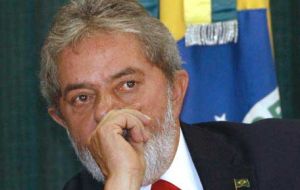MercoPress. South Atlantic News Agency
Brazil Lula da Silva will talk for Latinamerica in meeting with Obama
 Brazilian President Lula da Silva
Brazilian President Lula da Silva Brazilian President Lula da Silva will urge US President Barack Obama on Saturday March 14 to open talks with governments in Venezuela and Cuba and make aid and development the focus of his Latin America policy. Lula da Silva is the first Latinamerican president to meet with Obama.
The Brazilian president would like the US to move away from what he sees as a heavy-handed approach to the region and focus on incentives to resolve economic and social problems. Relations between the US and much of Latin America were difficult under the recent Bush administration.
“What I want is for the United States to look at Latin America and South America with a friendly eye” Lula da Silva said last week. “We are a democratic and peaceful continent and the United States should look at production and development, not only drug-trafficking and organized crime”.
Lula da Silva who wants to give Brazil a greater voice on the international stage, including a permanent seat in an expanded UN Security Council criticized the US for stripping Bolivia of trade preferences last year because it allegedly did too little to combat drugs.
He said Washington should help the poor Andean nation fight poverty and drugs by increasing commerce and investment.
Praised by Wall Street for adopting market-friendly policies, Lula da Silva said he will urge Obama to improve ties with Venezuelan President Hugo Chavez, a fierce US critic and end the almost 50 year US trade embargo of Cuba.
“It's impossible not to talk about the Cuban embargo. It's indicative of US policy toward the region,” Foreign Minister Celso Amorim told reporters on Wednesday.
Ailing former Cuban leader Fidel Castro has expressed cautious optimism about Obama. Chavez said last week that he had authorized Lula da Silva to talk to Obama on his behalf, but added he has doubts about Obama's willingness to improve relations.
Brazil has high hopes for the visit and makes much of the fact that Lula da Silva is one of the first heads of state to be received in Washington by Obama, following visits by the prime ministers of Britain and Japan.
Brazilian officials also are encouraged by what they see as common ground on policy and similarities in their rise to power. Lula is Brazil's first working-class president and Obama is the first African-American to win the White House.
“There's an affinity of thought that will allow us to deepen the relationship,” Amorim said.
Brazil as a leading global exporter of agriculture commodities is lobbying strongly for free trade and a quick agreement on the WTO Doha round. But US Trade Representative's criticism of proposed safeguards for developing countries in the Doha round of global trade negotiations dampened hopes Lula da Silva could persuade Obama to push for a quick conclusion to the seven-year-old talks.
The magnitude of the economic crisis in the US also may make it difficult for Brazil to focus Obama's attention on Cuba and Venezuela let alone Brazil's demand for a cut to US import tariffs on Brazilian ethanol.
“He's not going to solve the ethanol problem or get any pledges of investment, much less advance Doha in midst of a global crisis,” said Rubens Barbosa, a former Brazilian ambassador to Washington. “And the US Congress is approving a minimalist reform of the Cuban embargo.”
“He will get recognition that Brazil is a special partner for its growing economic importance and its role as a moderator in the region and given the relative US indifference toward Latin America, that's not bad”.




Top Comments
Disclaimer & comment rulesCommenting for this story is now closed.
If you have a Facebook account, become a fan and comment on our Facebook Page!